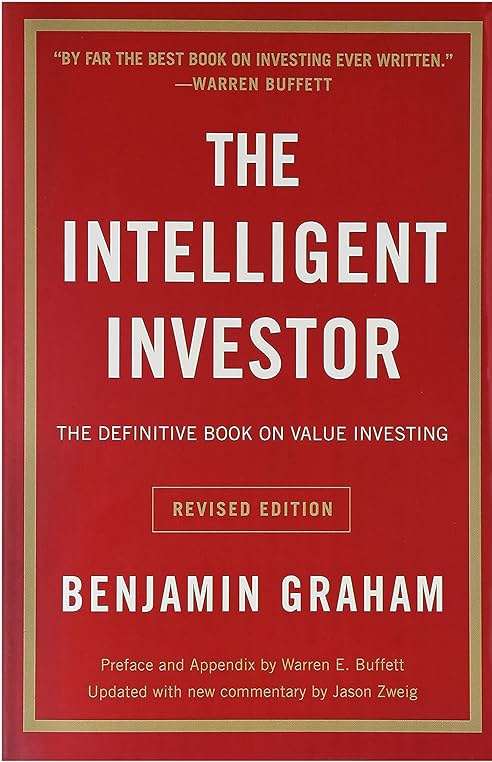The Intelligent Investor PDF Download (Direct Link)
The Intelligent Investor PDF Download (Direct Link)
The greatest investment advisor of the twentieth century, Benjamin Graham, taught and inspired people worldwide. Graham’s philosophy of “value investing”—which shields investors from substantial error and teaches them to develop long-term strategies—has made The Intelligent Investor the stock market bible ever since its original publication in 1949.
Over the years, market developments have proven the wisdom of Graham’s strategies. While preserving the integrity of Graham’s original text, this revised edition includes updated commentary by noted financial journalist Jason Zweig, whose perspective incorporates the realities of today’s market, draws parallels between Graham’s examples and today’s financial headlines, and gives readers a more thorough understanding of how to apply Graham’s principles.
Vital and indispensable, this revised edition of The Intelligent Investor is the most important book you will ever read on how to reach your financial goals.
Review
Since it was first published in 1949, Graham’s investment guide has sold over a million copies and has been praised by such luminaries as Warren E. Buffet as “the best book on investing ever written.” These accolades are well deserved. In its new form–with commentary on each chapter and extensive footnotes prepared by senior Money editor, Jason Zweig–the classic is now updated in light of changes in investment vehicles and market activities since 1972. What remains is a better book. Graham’s sage advice, analytical guides, and cautionary tales are still valid for the contemporary investor, and Zweig’s commentaries demonstrate the relevance of Graham’s principles in light of 1990s and early twenty-first century market trends. –Patrick O’Kelley
From the Back Cover
The classic bestseller by Benjamin Graham, perhaps the greatest investment advisor of the Twentieth Century, The Intelligent Investor has taught and inspired hundreds of thousands of people worldwide. Since its original publication in 1949, Benjamin Graham’s book has remained the most respected guide to investing, due to his timeless philosophy of “value investing,” which helps protect investors against areas of (possible) substantial error and teaches them to develop long-term strategies which they will be comfortable with down the road.
Among this audio’s special features are the use of numerous comparisons of pairs of common stocks to bring out their elements of strength and weakness and the construction of investment portfolios designed to meet specific requirements of quality and price attractiveness.
Read by Bill McGowan
About the Author
Benjamin Graham (1894–1976), the father of financial analysis and value investing, has been an inspiration for generations of the world’s most successful businesspeople. He was also the author of Security Analysis and The Interpretation of Financial Statements.
Bill McGowan is the founder and CEO of Clarity Media Group. A two-time Emmy Award–winning correspondent, McGowan has conducted hundreds of interviews with newsmakers, CEOs, celebrities, authors, editors, attorneys, and athletes. McGowan now uses that experience to coach and train everyone from corporate CEOs to celebrities such as New York Giants quarterback Eli Manning, the actress Katherine Heigl, and the jazz great Wynton Marsalis. He also speaks regularly to large corporate audiences at such companies as Credit Suisse, Condé Nast, and Campbell’s.
Excerpt. © Reprinted by permission. All rights reserved.
The Intelligent Investor CD
The Classic Text on Value InvestingBy Benjamin GrahamHarperAudio
Copyright © 2005 Benjamin Graham
All right reserved.
ISBN: 9780060793838
CHAPTER ONE
Investment versus Speculation: Results to Be Expected by the Intelligent Investor
This chapter will outline the viewpoints that will be set forth in the remainder of the book. In particular we wish to develop at the outset our concept of appropriate portfolio policy for the individual, nonprofessional investor.
Investment versus Speculation
What do we mean by “investor”? Throughout this book the term will be used in contradistinction to “speculator.” As far back as 1934, in our textbook Security Analysis,1 we attempted a precise formulation of the difference between the two, as follows: “An investment operation is one which, upon thorough analysis promises safety of principal and an adequate return. Operations not meeting these requirements are speculative.”
While we have clung tenaciously to this definition over the ensuing 38 years, it is worthwhile noting the radical changes that have occurred in the use of the term “investor” during this period. After the great market decline of 1929-1932 all common stocks were widely regarded as speculative by nature. (A leading authority stated flatly that only bonds could be bought for investment.2)
Thus we had then to defend our definition against the charge that it gave too wide scope to the concept of investment.
Now our concern is of the opposite sort. We must prevent our readers from accepting the common jargon which applies the term “Investor” to anybody and everybody in the stock market. In our last edition we cited the following headline of a front-page article of our leading financial journal in June 1962:
SMALL INVESTORS BEARISH, THEY ARE SELLING ODD-LOTS SHORT
In October 1970 the same journal had an editorial critical of what it called “reckless investors,” who this time were rushing in on the buying side.
These quotations well illustrate the confusion that has been dominant for many years in the use of the words investment and speculation. Think of our suggested definition of investment given above, and compare it with the sale of a few shares of stock by an inexperienced member of the public, who does not even own what he is selling, and has some largely emotional conviction that he will be able to buy them back at a much lower price. (It is not irrelevant to point out that when the 1962 article appeared the market had already experienced a decline of major size, and was now getting ready for an even greater upswing. It was about as poor a time as possible for selling short.) In a more general sense, the later-used phrase “reckless investors” could be regarded as a laughable contradiction in terms-something like “spendthrift misers” — were this misuse of language not so mischievous.
The newspaper employed the word “investor” in these instances because, in the easy language of Wall Street, everyone who buys or sells a security has become an investor, regardless of what he buys, or for what purpose, or at what price, or whether for cash or on margin. Compare this with the attitude of the public toward common stocks in 1948, when over 90% of those queried expressed themselves as opposed to the purchase of common stocks.3 About half gave as their reason “not safe, a gamble,” and about half, the reason “not familiar with.” It is indeed ironical (though not surprising) that common-stock purchases of all kinds were quite generally regarded as highly speculative or risky at a time when they were selling on a most attractive basis, and due soon to begin their greatest advance in history; conversely the very fact they had advanced to what were undoubtedly dangerous levels as judged by past experience later transformed them into “investments,” and the entire stock-buying public into “investors.”
The distinction between investment and speculation in common stocks has always been a useful one and its disappearance is a cause for concern. We have often said that Wall Street as an institution would be well advised to reinstate this distinction and to emphasize it in all its dealings with the public. Otherwise the stock exchanges may some day be blamed for heavy speculative losses, which those who suffered them had not been properly warned against. Ironically, once more, much of the recent financial embarrassment of some stock-exchange firms seems to have come from the inclusion of speculative common stocks in their own capital funds. We trust that the reader of this book will gain a reasonably clear idea of the risks that are inherent in common-stock commitments-risks which are inseparable from the opportunities of profit that they offer, and both of which must be allowed for in the investor’s calculations.
What we have just said indicates that there may no longer be such a thing as a simon-pure investment policy comprising representative common stocks-in the sense that one can always wait to buy them at a price that involves no risk of a market or “quotational” loss large enough to be disquieting. In most periods the investor must recognize the existence of a speculative factor in his commonstock holdings. It is his task to keep this component within minor limits, and to be prepared financially and psychologically for adverse results that may be of short or long duration.
Two paragraphs should be added about stock speculation per se, as distinguished from the speculative component now inherent in most representative common stocks. Outright speculation is neither illegal, immoral, nor (for most people) fattening to the pocketbook. More than that, some speculation is necessary and unavoidable, for in many common-stock situations there are substantial possibilities of both profit and loss, and the risks therein must be assumed by someone. There is intelligent speculation as there is intelligent investing.But there are many ways in which speculation may be unintelligent…
1. Benjamin Graham, David L. Dodd, Sidney Cottle, and Charles Tatham, McGraw-Hill, 4th. ed., 1962.
2. This is quoted from Investment and Speculation, by Lawrence Chamberlain, published in 1931.
3. In a survey made by the Federal Reserve Board.
Continues…
Excerpted fromThe Intelligent Investor CDbyBenjamin GrahamCopyright © 2005 by Benjamin Graham. Excerpted by permission.
All rights reserved. No part of this excerpt may be reproduced or reprinted without permission in writing from the publisher.
Excerpts are provided by Dial-A-Book Inc. solely for the personal use of visitors to this web site.
From AudioFile
First Aid for the USMLE Step 3 3rd Edition PDF Download
The Intelligent Investor PDF Download
Alright, now in this part of the article, you will be able to access the free download of The Intelligent Investor using our direct links mentioned at the end of this article. We have uploaded a genuine PDF ebook copy of this book to our online file repository so that you can enjoy a blazing-fast and safe downloading experience.








